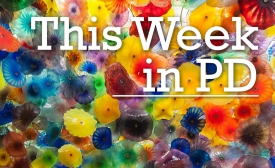soft power
For China, the film industry’s lure is evident. China hopes to tap into Hollywood’s expertise as it builds up its own nascent entertainment industry. It also understands popular culture’s potential as a PR platform for the Chinese Communist Party on the global stage.

Headlines about art diplomacy are on display in this PD News roundup.
What if the solutions to Europe’s most pressing problems lie not in politics or diplomacy, but in art and culture? With the European Union under pressure from economic stagnation, a wave of refugees, terror attacks and the possibility of Britain leaving the bloc, more than 150 cultural figures from 37 countries — including the actor Jude Law and the architect Rem Koolhaas — gathered here at a forum last week to explore that possibility.
Surprisingly, some of these leaders, particularly in Russia and China, have been wielding a sophisticated and deceptive soft power beyond their borders that is proving more enduring and effective than in the past. Their tactics are asymmetrical and subversive, using deception and disinformation, not easily confronted.
Australians think China already dominates Asia – more than the Chinese even believe it themselves. [...] It's all in a sobering set of survey results that point to the success of Chinese soft power diplomacy here in Australia, according to Simon Jackman, chief executive of Sydney University's US Studies Centre, which carried out the survey.
Australian animals have long been dispatched internationally as a form of diplomacy. In the past two years however, it has been koalas, rather than the platypi, who have shot to international notice as key Australian contenders in political power plays.
How can a million people be made to feel welcome as our guests? How can Palmyra be saved? How should the world see Germany? The right approach to cultural policy can give answers, says DW's Gero Schliess.
Soft power has become strategically important for China and is regarded an important component of its “comprehensive national power” , a measure of its own national power.







